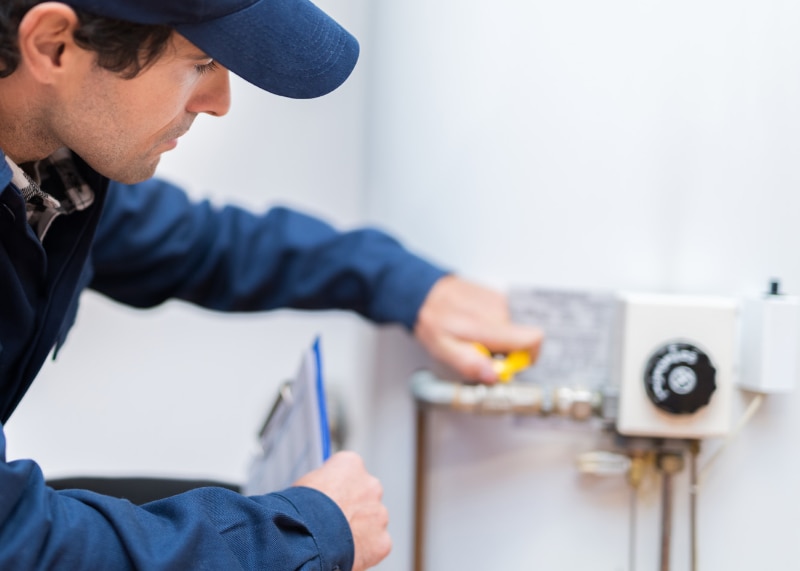Action Plan For Regular Water Heater Malfunctions
Action Plan For Regular Water Heater Malfunctions
Blog Article
They are making a number of great points relating to Common Problems with Your Home Water Heater overall in this article below.

Envision beginning your day without your regular warm shower. That already establishes an inadequate tone for the remainder of your day.
Every home requires a reputable hot water heater, however only a few know just how to handle one. One easy means to keep your hot water heater in leading shape is to look for faults consistently and also fix them as quickly as they appear.
Keep in mind to turn off your hot water heater prior to sniffing about for mistakes. These are the hot water heater faults you are most likely to experience.
Water as well warm or as well cold
Every hot water heater has a thermostat that figures out how warm the water obtains. If the water entering your home is as well hot in spite of setting a convenient maximum temperature level, your thermostat might be faulty.
On the other hand, also cold water might be due to a failed thermostat, a busted circuit, or inappropriate gas circulation. For example, if you use a gas hot water heater with a broken pilot burner, you would certainly obtain cold water, even if the thermostat remains in best condition. For electric heating systems, a blown fuse might be the perpetrator.
Inadequate hot water
Hot water heater can be found in numerous sizes, relying on your hot water needs. If you run out of warm water before every person has had a bathroom, your water heater is as well small for your family size. You must think about mounting a larger hot water heater tank or selecting a tankless water heater, which occupies less area and also is more long lasting.
Weird noises
There are at least 5 sort of noises you can speak with a hot water heater, yet one of the most common interpretation is that it's time for the water heater to retire.
Firstly, you must know with the regular appears a water heater makes. An electric heating unit may sound different from a gas-powered one.
Popping or banging sounds generally indicate there is a slab of sediment in your containers, and it's time to cleanse it out. On the other hand, whistling or hissing noises might just be your valves allowing some pressure off.
Water leakages
Leaks can come from pipelines, water links, valves, or in the worst-case situation, the container itself. With time, water will corrode the storage tank, as well as discover its way out. If this takes place, you need to replace your water heater asap.
Nevertheless, prior to your modification your entire container, be sure that all pipelines remain in area which each valve functions perfectly. If you still require aid determining a leakage, call your plumber.
Rust-colored water
Rust-colored water means one of your hot water heater parts is corroded. It could be the anode rod, or the tank itself. Your plumber will have the ability to recognize which it is.
Warm water
Despite how high you set the thermostat, you won't get any hot water out of a heating unit well past its prime. A water heater's efficiency might lower with time.
You will certainly additionally obtain warm water if your pipes have a cross connection. This means that when you activate a faucet, hot water from the heating system streams in alongside normal, cold water. A cross connection is very easy to area. If your hot water taps still follow shutting the hot water heater valves, you have a cross connection.
Discoloured Water
Rust is a significant root cause of dirty or discoloured water. Deterioration within the water storage tank or a failing anode pole could trigger this discolouration. The anode rod secures the tank from rusting on the inside and also need to be inspected yearly. Without a pole or an effectively functioning anode pole, the warm water rapidly rusts inside the tank. Contact an expert water heater service technician to determine if replacing the anode rod will certainly repair the issue; if not, replace your water heater.
Conclusion
Preferably, your water heater can last ten years before you need a modification. However, after the 10-year mark, you might experience any one of these faults much more consistently. At this point, you need to include a new water heater to your budget.
How To Troubleshoot 3 Common Water Heater Problems in Twin Cities
The Water Heater Is Leaking
A leaky cold water inlet valve A loose pipe fitting A leaky temperature and pressure relief valve A corroded anode rod A cracked tank Turn Off Your Water Heater:
Shut off your gas water heater by turning the gas valve on the unit to the “OFF” position. Shut off your electric water by switching its power off at your electrical panel. Look for a two-pole breaker labeled “water heater” and turn it to the “OFF” position. Move the ball valve connected to the water heater to be perpendicular to the piping at a 90° angle. Look for the Leak:
Depending on whether the water is coming from the tank's top or bottom, you’ll want to look for the leak in different locations.
If the leak comes from the top of the tank, carefully look for water escaping from the cold water inlet valve or loose pipe fittings. Rusted hot and cold water valves can have loose connections with the tank, with water leaking out of them.
https://mspplumbingheatingair.com/blog/how-to-troubleshoot-3-common-water-heater-problems
Hopefully you liked our post on Common Problems with Tank Water Heaters. Many thanks for finding the time to read through our content. Enjoyed reading our blog entry? Please share it. Help other people locate it. I take joy in reading our article about Common Problems with Tank Water Heaters.
Guaranteed fix? Call. Report this page